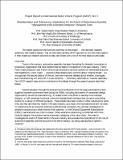Modularization and Outsourcing: Implications for the Future of Automotive Assembly "Management of the Extended Enterprise" Research Team
Author(s)
Warburton, Max; Helper, Susan; MacDuffie, John Paul; Pil, Frits; Sako, Mari; Takeishi, Akira; ... Show more Show less
DownloadModStudy.pdf (38.15Kb)
Metadata
Show full item recordAbstract
Overview
Twice in this century, automotive assembly has been the setting for dramatic innovations in
production organization that have transformed the basis of competition in the auto industry. Henry
Ford's mass production and Taiichi Ohno's lean production are both systems of interrelated practices
held together by a core "logic" - powerful ideas shaping how we think about "making things". As
we approach the second century of the car, there are important debates about whether, once again,
auto manufacturing will strike off in a new direction -- commonly described as "modular assembly."
Our IMVP research team aims to contribute to this debate through the research project described
below.
Deverticalization through the outsourcing of production from the large automakers to their
suppliers has been a dominant trend during the 1990s, including the transfer of component design
responsibility as well as manufacturing. A related trend is the effort to develop more modular
designs, i.e. self-contained functional units with standardized interfaces that can serve as building
blocks for a variety of different products. These trends have been visible in other industries for some
time, but they are relatively recent in the auto industry; as a result, the implications are still not clear.
In industries such as consumer electronics and personal computers, the ultimate consequence of
extensive outsourcing is often that the final customer, i.e. the Original Equipment Manufacturer
(OEM), manufactures very little in-house. When extensive outsourcing is combined with more
modular designs, the outcome can be a dramatic reshaping of the value chain. We want to
investigate the extent of these trends in the auto industry and evaluate the implications for the role of
automotive assembly and the structure of the entire industry, by doing case studies of specific
modules.2
Date issued
2002-06-26Keywords
automotive assembly, modularization, outsourcing, commodization